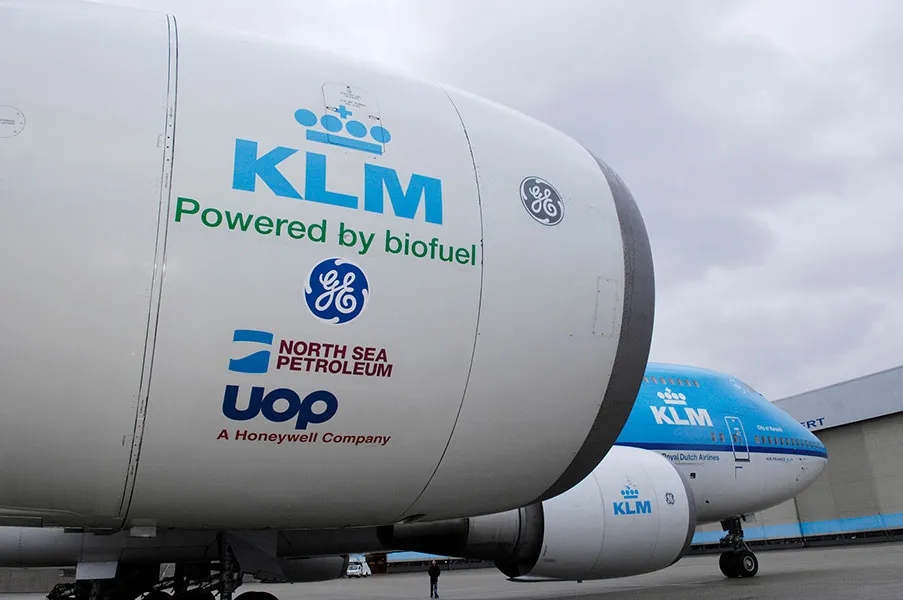
SkyNRG hopes to stimulate biofuel production with world-first scheme.
Oct 08, 2019

SkyNRG aims to boost biofuel production through an innovative scheme that is the first of its kind globally. By partnering with various stakeholders, including airlines and fuel producers, the initiative seeks to create a sustainable supply chain for biofuels derived from waste materials. The project emphasizes the importance of reducing carbon emissions in the aviation sector by promoting the use of renewable energy sources. With a focus on scalability, SkyNRG's approach not only addresses environmental concerns but also encourages investment in sustainable practices, making it a significant step towards a greener future in aviation.
Understanding SkyNRG's Innovative Biofuel Scheme
SkyNRG, a leader in sustainable aviation fuel (SAF), is on a mission to revolutionize the biofuel industry with its pioneering scheme aimed at stimulating biofuel production globally. This initiative is not just about creating a sustainable alternative to traditional fossil fuels; it represents a significant shift in how we think about energy production and consumption. By leveraging innovative technologies and partnerships, SkyNRG aims to make sustainable aviation fuel more accessible and economically viable.
The Importance of Biofuels
Biofuels play a crucial role in reducing greenhouse gas emissions and transitioning towards a more sustainable energy future. Unlike conventional fossil fuels, which release significant amounts of carbon dioxide when burned, biofuels can be produced from renewable sources, thus contributing to lower overall carbon footprints. With the aviation sector being one of the most challenging industries to decarbonize, initiatives like SkyNRG's are vital in driving the production and adoption of biofuels.
Key Features of SkyNRG's Initiative
SkyNRG's scheme is designed to address several critical barriers to biofuel production:
- Cost Reduction: One of the main challenges in biofuel production is the high cost compared to traditional fuels. SkyNRG aims to lower production costs through technological advancements and economies of scale.
- Increased Supply Chain Efficiency: By collaborating with various stakeholders, including farmers, producers, and airlines, SkyNRG seeks to streamline the supply chain, making the process of sourcing materials for biofuel production more efficient.
- Regulatory Support: SkyNRG is working closely with governments and regulatory bodies to create a favorable environment for biofuel production, including incentives and subsidies.
Chart: Projected Growth in Biofuel Production
Below is a chart illustrating the projected growth in biofuel production over the next decade, highlighting the potential impact of SkyNRG’s innovative scheme:
| Year | Biofuel Production (Million Liters) | Growth Rate (%) |
|---|---|---|
| 2023 | 200 | - |
| 2024 | 250 | 25% |
| 2025 | 350 | 40% |
| 2026 | 500 | 43% |
| 2027 | 700 | 40% |
| 2028 | 1000 | 43% |
Collaborations and Partnerships
SkyNRG's strategy includes forming strategic partnerships with various stakeholders in the industry. These collaborations are essential for:
- Research and Development: Partnering with research institutions to innovate and develop new biofuel technologies that can increase efficiency and reduce costs.
- Supply Chain Development: Working with agricultural producers to ensure a steady supply of raw materials for biofuel production.
- Market Expansion: Collaborating with airlines and other sectors to create demand for biofuels, ensuring that the market for sustainable aviation fuel grows.
Challenges Ahead
Despite the promising outlook, SkyNRG faces several challenges in its quest to stimulate biofuel production:
- Competition with Fossil Fuels: Traditional fossil fuels are often cheaper and more readily available, making it difficult for biofuels to compete on price.
- Public Awareness: There is still a lack of awareness about the benefits of biofuels among consumers and businesses, which can hinder adoption.
- Regulatory Hurdles: Navigating the complex landscape of regulations can be challenging, particularly in different regions with varying policies on biofuel production.
The Future of Biofuels
SkyNRG's initiative is a step towards a greener future, where sustainable aviation fuel becomes a staple in the industry. By stimulating biofuel production, SkyNRG is not only contributing to environmental sustainability but also paving the way for a new economic landscape focused on renewable energy sources. As the world continues to grapple with climate change and its impacts, initiatives like SkyNRG's will be crucial in driving the transition to a more sustainable future.
Conclusion
The innovative scheme introduced by SkyNRG represents a significant leap forward in the biofuel sector. By addressing key challenges and fostering collaborations, SkyNRG aims to make biofuels a mainstream option for the aviation industry and beyond. The success of this initiative could set a precedent for other industries, showcasing the potential of biofuels in combating climate change and promoting sustainability. As we look to the future, the importance of such initiatives cannot be overstated, as they hold the key to a sustainable energy transition.
Related Articles

Explore Thailand: The Best Islands to Visit for Paradise, Adventure, and Relaxation

The Ultimate Guide to the Best Islands in Thailand for Your Next Getaway

Do babies need passports? How to get a passport for a newborn

How to get a U.S. passport fast: here’s how to expedite the process

What is Mobile Passport Control: 5 reasons why you should use it

SENTRI vs. Global Entry: A detailed guide

Do you need a passport to go to the Bahamas? Let’s find out

Do you need a passport to go to Mexico? A detailed guide

Do you need a passport to go to Canada? We got the answer

Do You Need a Passport for a Cruise: An Essential Travel Guide

Booster Seat Requirements: All the Rules to Follow in Your Rental Car

What Are the World’s Most Powerful Passports, and How Does Yours Rank?

How to Take a Passport Photo at Home: A Helpful Guide

You've got to have heart! Southwest's new livery

Your opinion: Should water be free on low cost carriers?

Young women bolder than guys as solo travellers
